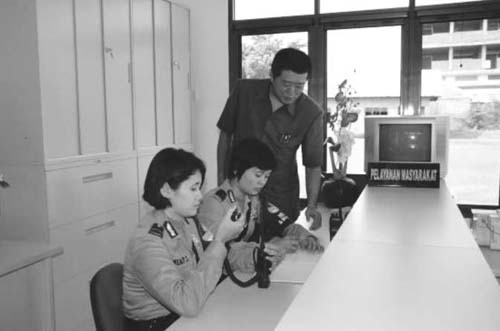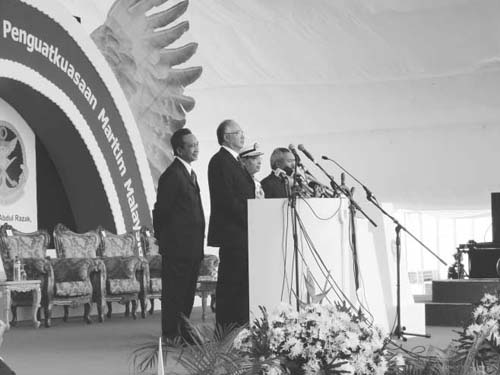Japan's Official Development Assistance White Paper 2006
Main Text > Part II ODA DISBURSEMENTS IN FISCAL YEAR 2005 > Chapter 2 Details about Japan's ODA > Section 2. Measures for Each of the Priority Issues > 2. Sustainable Growth > (2) Policy Formulation and Institution Building
(2) Policy Formulation and Institution Building
For the objective of sustainable development in developing countries, not only the establishment of economic and social infrastructure, but also the offering of assistance from the perspectives of policy making, institution building, and human resource development are required. The ODA Charter regards human resource development and the establishment of laws and institutions as the prioritized policy for Japan's ODA. Under this Charter, the Medium-Term Policy on ODA lists eradicating corruption, implementing legal and institutional reforms, improving the efficiency and transparency of public administration, and strengthening the administrative capacity of local government.
At the G7 Lyon Summit in 1996, Japan announced the Partnership for Democratic Development (PDD). Based on its principles, Japan has been enhancing its efforts to assist in developing various institutions such as the legal system, administrative system, civil servant system, police system, supporting elections; strengthening civil society; and improving the status of women, among others.
 Assistance to Enhance Governance
Assistance to Enhance GovernanceAs part of its assistance for institution building, Japan provided Indonesia with a Development Policy Loan (DPL) in March 2006, following a similar loan in the previous year. This DPL was cofinanced with the World Bank and the Asian Development Bank (ADB). Japan extended US$100 million while the World Bank extended US$400 million, and ADB US$200 million. The loan is to support the Indonesian government's efforts to carry out reform in the areas of stabilization of the macro-economy, improvement of the investment climate, improvement of public finance management and governance such as anti-corruption, as well as poverty reduction.
In June 2005 Japan and the African Development Bank (AfDB) Group announced the Enhanced Private Sector Assistance for Africa (EPSA for Africa), a joint initiative to develop the private sector in Africa aimed at the sustainable development of African countries. For the purpose of comprehensive assistance for Africa's private sector, EPSA for Africa encompasses five major areas: the improvement of the investment climate; the reinforcement of the financial sector; improvement of economic and social infrastructure; assistance for small-to-medium size enterprises; and promotion of trade and direct investment (see Chapter 2, Section 3 for details on EPSA for Africa). An example of Japan's assistance in this initiative is non-project grant aid geared to the development of the private sector. Specifically in Ghana, a fund which Japan decided to appropriate as non-project grant aid in August 2006 has been used to import equipment and materials for processing, among others, based on the needs of the country's private sector. This grant assistance is expected to help enhance the productivity of the country's private businesses and create more job opportunities.
Moreover, in Viet Nam, Cambodia, Laos, Uzbekistan, and other countries the development of legal systems is a current issue as they make efforts to introduce market economies and adopt policies to open their economies to foreign competition. Therefore, in FY2005, Japan continued to provide assistance which had been given in FY2004 to these countries, in drafting and revising bills and enacting laws related to civil codes and civil procedure codes, as well as assistance to train legal professionals. As a result of this assistance, the revised civil code, civil procedure code, enterprise bankruptcy law were enacted at the National Assembly and enforced in Viet Nam. Progress has also been made in Cambodia, where the National Assembly enacted civil procedure codes in July 2006. Besides these commitments, Japan also helps train legal professionals through assistance extended to the National Judicial Academy of Viet Nam and the Royal School of Judges and Prosecutors of the Royal Academy for Judicial Professions in Cambodia.
Also, from October to November 2005 an international training course on corruption control in criminal justice was organized by the United Nations Asia and Far East Institute for the Prevention of Crime and the Treatment of Offenders (UNAFEI).15 With the participation of 15 developing countries primarily from Asia, the course offered opportunities to consider problems and countermeasures regarding the current situation of corruption and measures taken in criminal justice.
Furthermore, in the area of improving the capability of police agencies that constitute a cornerstone in maintaining domestic order, Japan has been providing assistance that combines facility development and equipment provision with the priority of human resource development, including support to build institutions and improve administrative capacity. As part of the Support Program for Reform of Indonesian National Police, Japan has been dispatching experts to Indonesia and also accepting trainees from the country since 2001. The country's national police became independent of the national army in 2000, and the democratization of the organization has been promoted with the aim of consolidating it as a civil police force. To support such endeavors, Japan had accepted a total of 94 trainees from the country by June 2005. The trainees learned how the Japanese police investigate criminal cases and the technologies used by their crime laboratory, among others. In addition, Japan has provided equipment as grant aid for wireless communication systems and simple drug identification sets. These moves contributed to the safety of citizens, as the improved wireless network has enabled the authorities to respond quickly to calls from citizens and the technology has been improved in the inspection of narcotic agents based on physical evidence.

A scene of using a wireless device (the Indonesian National Police Reform Assistance Program)
In Brazil, Japan continues the technological transfer of the police box system. Specifically, based on requests by the Government of Brazil, Japan dispatches short-term experts to the country and accepts trainees. In January 2005, Community Policing Project for the Federative Republic of Brazil was started with a view to making most of the past experiences, enhance the operation of the police box system, and make Brazil a model country for the technology transfer to introduce the system in Central and South Americas. In 2005 Japan accepted 20 trainees to introduce them to Japanese police activities in local communities through police stations and boxes.
In addition, to Southeast Asian countries that are putting forth various efforts in view of maintaining security and ensuring safety at sea, Japan has been providing assistance in institution building and human resource development. In the Philippines, the coast guard separated from the naval force in 1998, for which Japan has been implementing active assistance. Programs included technological enhancement for criminal crackdowns, and marine rescues; the establishment of training course curriculum for the human resource development that is key to future institutional development; and the training of instructors. In Malaysia, the Malaysian Maritime Enforcement Agency officially began its operations on November 30, 2005. From the agency's preparatory stages, Japan had dispatched experts to offer comprehensive advice. In Indonesia, deliberation is underway with advice from Japan to establish a Sea Security Coordination Agency, planned to be equipped with inter-ministerial coordinating functions with a view to achieving a more efficient performance by the relevant operations.

Inauguration ceremony of the Malaysian Maritime Enforcement Agency (Photo: Japan Coast Guard)
Furthermore, to ensure proper political processes, Japan dispatched lecturers to Kyrgyz in Central Asia to assist its presidential election in FY2005. The lecturers held seminars on the management of political funds and fair and appropriate election administration. To Iraq, which is committed to nation building towards the consolidation of peace, Japan invited members of the Independent Electoral Commission of Iraq (IECI) to undergo training courses in Japan to acquire basic knowledge of election administration.


 Next Page
Next Page